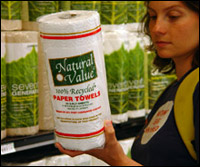Climate Culture
All Stories
-
Weeding, Writing, ‘Rithmetic
Locally grown foods catching on at college dining halls The local-and-seasonal food movement is going to college. About 200 schools around the country have joined programs that supply them with locally grown foods, like Brown University in Providence, R.I., where locally farmed Pippin and Macoun apples proved so much more popular than Granny Smiths and […]
-
When it comes to green products, who’s zoomin’ who?
“I don’t trust ‘natural.’ People are always dying of natural causes.”— Woman looking at food labels, in a Richard Guindon cartoon Roll playing games? Photo: Laura Cacho. Shoppers of the world, I have just one question: Are you an eco-chump? Lots of us try to shop green. We buy unbleached paper towels and recycled products, […]
-
We Don’t Need No Stinkin’ Garbage
Seattle to reduce landfilling by producing less trash in the first place Seattle is pioneering programs to cut landfill costs by stopping trash before it starts, pursuing an ambitious long-term goal of becoming a “zero-waste” city. Seattle Public Utilities is using more electronic documents, radically reducing its use of paper, and instituting a green buying […]
-
PET Cemetery
New recycling plant may help Mexico cope with litter and landfills Mexicans lead the globe in gulping sugary drinks, but recycle only a thin sliver of the 9 billion PET (polyethylene terephthalate) bottles they use every year. Hoping to jump-start a national culture of recycling, Environment Minister Jose Luis Luege attended last week’s opening of […]
-
Slitherin’ Scholastic
Greens urge boycott of Harry Potter’s U.S. publisher J. K. Rowling and a coalition of eco-Muggles are giving props to Canadian publisher Raincoast Books for printing Rowling’s hotly anticipated sixth novel — Harry Potter and the Half-Blood Prince, being released tonight — entirely on recycled paper. Canadian conservation group Markets Initiative estimates that Raincoast’s good […]
-
Sundance getaway converts mayors into climate activists
Salt Lake City played host to mayors getting up to speed on climate issues. City leaders from around the U.S. were treated to a rare bird’s-eye view of the environment earlier this week at the Sundance Summit, a three-day mayors’ retreat on climate change hosted by Robert Redford in Salt Lake City and at his […]
-
They’re everywhere!
I can't go outside anymore in Seattle without seeing a Toyota Prius -- actually make that several. To escape the onslaught, I ducked into a movie theater this past weekend to watch War of the Worlds. Just as I was thinking it would be just me, Tom, Dakota and a few alien friends, Mr. Prius showed up on the big screen to remind me that he's watching me. Is there no escape!?
-
Umbra on lawn mowers
Dear Umbra, OK, I hate lawns. But for a number of reasons, I have to move into a town where lawns are the law, and mowing a necessity. Can you give me the scoop on the most eco-friendly lawnmower that will still cut decently? (No, I can’t have goats.) My old reel lawnmower never did […]
-
Seth Heine of CollectiveGood answers questionsSeth Heine of CollectiveGood answers Grist’s
Seth Heine. With what environmental organizations are you affiliated? I’m the president of CollectiveGood and RIPMobile.com — mobile phone recyclers. What do your organizations do? What, in a perfect world, would constitute “mission accomplished”? CollectiveGood recycles mobile devices (phones, pagers, PDAs) and all of their related accessories, usually in partnerships with charities, companies, and/or governments. […]
-
Umbra on washing machines
Dear Umbra, I have a top-loading washing machine that’s nine years old. I’ve heard that front-loading machines are a lot more efficient and use less detergent, so I’m thinking about taking the plunge, even though my old machine works fine. How much less water do the front-loading machines use, and why? And is it true […]
